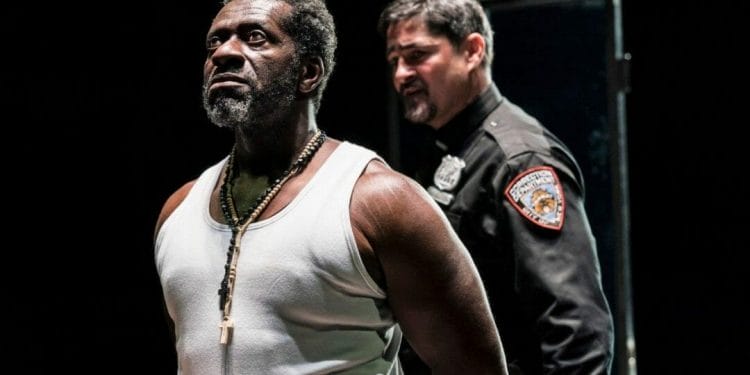 It’s rare that my mind wanders too far from my own responses while watching a play as absorbing as Kate Hewitt’s adaptation of Jesus Hopped the ‘A’ Train. Standing by the Young Vic’s crowded bar at the halfway stage however, I spare a thought for any radical atheists caught in the crossfire of Stephen Adly Guirgis’ script. The auditorium isn’t a place for those resolved to remain unaffected by religion’s reaches into the moral abyss.
It’s rare that my mind wanders too far from my own responses while watching a play as absorbing as Kate Hewitt’s adaptation of Jesus Hopped the ‘A’ Train. Standing by the Young Vic’s crowded bar at the halfway stage however, I spare a thought for any radical atheists caught in the crossfire of Stephen Adly Guirgis’ script. The auditorium isn’t a place for those resolved to remain unaffected by religion’s reaches into the moral abyss.
The play is a barrage of exegetical artillery. Oberon K. A. Adjepong is Lucius Jenkins, the mass-murdering ‘superstar’ inmate of New York’s Rikers Island jail. He wields his faith with the force of a murder weapon, leaving the ever-conflicted Angel Cruz (Ukweli Roach) grateful for the cages that separate them.
Incidentally, Angel awaits trial for ‘shooting a reverend in the ass’, a crude but perhaps justifiable (in context) response to his best friend’s indoctrination.
Dervla Kirwan is Mary Jane Hanrahan, the lawyer tasked with representing Angel. He’s stubborn and frenetic, but wonderfully sharp and warm. Mary Jane is the outsider: the free citizen, bringing takeaway chicken and an unrelenting belief not in the justice system, but in the effectiveness of shady logic and legal artifice.
As a pair their set-pieces struggle. While the sermonic Lucius speaks of redemption before God, of renouncing darkness and embracing salvation, the early interactions between client and lawyer feel underweight in comparison.
The possibility of Angel’s release neither excites nor propels the narrative: the real intrigue lies in Lucius’ preaching and his fascination with Angel. His verses are ominous in their imperfection, twisting and straining meaning to fit a self-conception moulded by years of racism, abuse, and mismanagement of his mental conditions.
Angel is impressionable yet stoic, and Roach plays his part with laudable balance and is devastatingly charisma. The audience bursts with laughter at his free-flowing movement through justice, faith, and redemption, topics afforded far greater clarity when discussed away from the constraints (ironically) of non-incarcerated existence. Oberon K. A. Adjepong too is genuinely stunning in these moments; he adds depth and texture to busy lines — a triumphant and tragic performance.
Magda Willi’s clever staging facilitates these passages, mobilising the cell walls to create alternate feelings of space and closure, while Peter Rice’s sound design is dominated by Ben Vince-esque saxophone and frantic drums.
A play about incarcerated people of colour is, by definition, about racism. Hewitt directs the vitriolic prison guard Valdez (Joplin Sibtain) to emphasise this fact, but the script remains underdeveloped in this key area. Perhaps less is more when the existing motifs are so striking.
Who or what do humans turn to when they have been stripped of everything? This is Guirgis’ essential question. If the answer is faith, then who guards these philosophies from misappropriation? Or are they ours alone to wield and refract? Jesus Hopped the ‘A’ Train revels in these complexities. Mirrors, not cages, provide the true path to justice and peace.






















